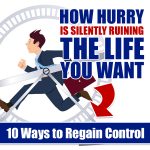Has this every happened to you? You had a dream or goal you were pursuing… and it meant a LOT to you.

You were striving and stretching to reach this important goal because you knew achieving it would be so awesome… maybe even a game changer.
- Getting that degree
- Losing 30 pounds
- Getting that promotion or your business to the next level
Yet, when you reached your goal, you found yourself surprisingly underwhelmed by how you felt. Sure, it felt great… but the thrill of victory evaporated as quickly as the morning dew.
I recently learned the science behind why this happens. This common experience has been called the Arrival Fallacy, where the anticipated payoff and the experience of the actual payoff are very different.
Why does this happen? More importantly, what can you do to avoid this empty feeling?
Understanding the Arrival Fallacy
Psychology expert/author Tal Ben-Shahar popularly highlighted the term “arrival fallacy” to describe this letdown experience. Chemical, physical, and emotional sources all contribute to this problem.
A. Chemical contribution
The best explanation I read on this dimension contributing to the arrival fallacy was from organizational psychologist and researcher Dr. Tasha Eurich:
When we start making progress towards a goal, our brain begins rewarding us by releasing the feel-good (and motivating) hormone dopamine. The closer we get, the more we’re rewarded.
Since the difficulty and resistance we experience when stretching for a goal has to be outweighed by the payoff of obtaining it, our brains help keep us motivated and in the game by rewarding us on our progress.
Dr. Eurich continues–
Yet when we finally achieve our goal, dopamine levels start to drop, and we’re biologically blocked from experiencing the positive emotions we anticipated.
So, you are riding this chemical induced high to reach your goal… but once you reach it, the brain suddenly thinks you don’t need it.
Stupid brain!
B. Physical contribution
Another contributor to the letdown experience is fatigue and exhaustion. You are pushing to reach the summit of the mountain, which is little by little depleting your energy.
When you hit the summit, you are often running on fumes… without the energy to fully enjoy the moment.
Let’s face it, fatigue and weariness can make the greatest thing in the world feel so-so.
C. Emotional contribution
The letdown feeling is often intensified by the expectations and “if only” stories we have built up in our imagination. If only…
- I could lose 30 pounds
- I could get that raise
- I could secure that dream job
… then my life would be sooooo much better.
But when the “if onlys” become a reality, you’re disappointed to discover that you’re not really as happy or fulfilled as you thought.
Your dream of “arriving” (and all that will change when you do), turns into an empty promise.
How to Overcome the Arrival Fallacy
There are 3 things you need to do to reduce the effects of the Arrival Fallacy.
1. Pace yourself to the summit, and give yourself time to recover when you get there
This is God’s prescription for the prophet Elijah. Elijah had just experienced an incredible high from a supernatural encounter with God’s power (see 1 Kings 18).
Instead of him being energized, he spiraled into a depression. If you don’t understand the arrival fallacy, it is easy to say “Elijah, this incredible spectacle just happened. Fire came down from heaven on your command. You should be pumped! Feeling depressed doesn’t make sense.”
But, now it does, right?
Here’s God’s prescription for him: You need to eat… and get some rest (see 1 Kings 19). Elijah was riding the wave of excitement and was depleted. He also thought this miracle was going to change everything… but it didn’t. I’ll touch on that in the next point.
Bottom line: You are a flesh and blood human, so as you chase your dreams remember to monitor your energy levels, the food you eat and the rest you need. Pace yourself while working toward the summit. Then once you reach the summit, give yourself some time to recover and get restored before you run after the next dopamine high goal.
2. Scale back your unrealistic expectations
Although those lofty payoff expectations can drive us forward when we face the inevitable challenges, they can also ruin the actual payoff.
We need to remember that we are terrible at predicting how we will feel in the future. This dynamic, called Affective Forecasting (and explained here), reveals how we consistently imagine a payoff that is much better than what actually happens.
Over and over again, we set ourselves up for disappointment.
Rarely is something “so awesome” that it could match the anticipation. We forget that awesome outcomes often bring with it their own (new) unanticipated problems. Getting the promotion can lead to more work and stress.
Therefore, you need to intentionally tone down the expectations and force yourself to be more realistic. Combining this step with the next one is crucial.
3. Focus on the process… and your progress
If you put all your eggs in the final payoff basket, you will often be disappointed in the payoff. But, you will be energized to keep going if you focus on the progress you are making over the entire journey to reach the goal.
Remember, our brains reward us with the satisfying feeling of dopamine while we are striving toward a goal. Why not savor the quest along the way?
That means taking the time daily or weekly to reflect on where you’ve been and the effort (and/or progress) you have made. I find there is a sense of personal pride that I am not settling in my comfort zone, but I am working toward a better tomorrow. Take time to enjoy that. Take time to celebrate the progress you are making (even if it is only 3 steps on a 100 step journey).
I may not be completely where I want to be (yet), but I am grateful I am not where I was.
Focus on your desired identity
James Clear notes in his outstanding book, Atomic Habits, that it is helpful to focus on the identity you are looking to become… and how a particular goal is helping you become who you aspire to be.
For example, if you focus on the outcome (lose 30 lbs.) and you reach it, the dopamine dries up and you experience a letdown.
But, if you focus on the process and progress of becoming a more fit person, then every step of the journey is energizing as you make progress… and become the person you really want to be.
The final outcome is really just a milestone on the path. Maybe after the 30 pounds are gone, you want to increase your stamina or energy level… or increase muscle mass, or a million other dimensions of a fit person.
This way, you always have another level to solidify who you are seeking to become… and the dopamine will keep flowing!
Your Turn!
How can you apply this science in your life this year? Share a comment below!









Very helpful in rethinking expectations to achieve greater consistency in goal setting. I especially enjoyed the Elijah reference, a Bible story so many are familiar with that offers more clarity to the emotions he experienced. Nice article, Pat!
Thanks for taking a moment to provide your thoughts on the article. I agree with you- examining your expectations ahead of time is crucial. I also appreciate the kind words!